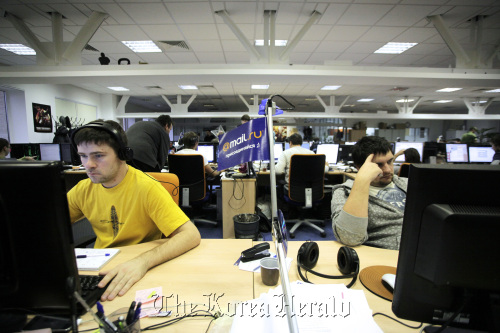MOSCOW (AFP) ― It is a company with a stake in Facebook, the leading position in one of the world’s fastest-growing Internet markets and a listing on the London Stock Exchange.
But this is not a firm from Silicon Valley or a high-tech Asian economy. It is from Russia, in recent years not a place known for cutting-edge corporate innovation.
While President Dmitry Medvedev ploughs on with his state-sponsored drive to modernize Russia, the privately-owned Mail.ru and its sister holding firm DST have grown with breathtaking speed.
Like other countries with a distinctive culture and non-Latin script writing, the Russian net market has allowed local websites to expand alongside established international players like Facebook and Google.
With penetration of broadband Internet now finally growing fast in Russia, Mail.ru has the capacity to expand its domestic e-mail, gaming and networking empire and set its targets high abroad.
But this is not a firm from Silicon Valley or a high-tech Asian economy. It is from Russia, in recent years not a place known for cutting-edge corporate innovation.
While President Dmitry Medvedev ploughs on with his state-sponsored drive to modernize Russia, the privately-owned Mail.ru and its sister holding firm DST have grown with breathtaking speed.
Like other countries with a distinctive culture and non-Latin script writing, the Russian net market has allowed local websites to expand alongside established international players like Facebook and Google.
With penetration of broadband Internet now finally growing fast in Russia, Mail.ru has the capacity to expand its domestic e-mail, gaming and networking empire and set its targets high abroad.

“The Internet sector in Russia is one of the fastest-growing in the world,” analysts at the Renaissance Capital brokerage in Moscow said in a report on Mail.ru this week. “The Internet run has quite a way to go.”
Russia’s Internet penetration rate is still only 45 percent, compared with 84 percent in Britain, but broadband Internet access is now expanding fast, it said.
Mail.ru can boast full ownership of Russia’s number one e-mail provider, mail.ru, its number two social networking site Odnoklassniki (Classmates) and number three Moi Mir (My World).
But it has also acquired a holding of 32.55 percent in Russia’s top social networking site, Vkontakte (In Contact), and also 2.38 percent in Facebook itself, which still lags behind homegrown competitors in Russia.
According to Renaissance Capital, Facebook is only the number four social networking site in Russia with 5 million users, compared with 21 million for Vkontakte and 17 million for Odnoklassniki.
“To date cultural factors in Russia ― as in other countries such as Japan, China and South Korea ― have favored strong local incumbents and this is unlikely to change immediately,” it said.
Mail.ru also has a minority stake of 1.5 percent in U.S. online games firm Zynga and 5.1 percent in deal-of-the-day portal Groupon.
Mail.ru and DST Global were created last year after the split of what had been a single firm ― Digital Sky Technologies ― into an Internet company and investment vehicle.
The two firms are owned by private shareholders including Internet tycoon and Mail.ru chief executive Yury Milner and Alisher Usmanov, a billionaire oligarch who also owns a stake in Arsenal football club.
Meanwhile, Mail.ru also has new media giant Naspers as a shareholder and enjoyed a hugely successful IPO last November on the LSE in an IPO that valued it at $5.7 billion.
DST Global also has its own stakes in Zynga, Groupon and Facebook and according to some reports the company now controls 10 percent in the U.S. social networking giant.
The group also recently invested an additional $50 million in Facebook, adding to a $450 million injection from Goldman Sachs.
Milner is one of Russia’s lowest-key tycoons whose avoidance of publicity is a stark contrast to the attention-hungry oligarchs who dominated Russian business in the 1990s.
But in a rare interview with Russian business daily Vedomosti last month, he made no secret of the company’s global ambitions. “We have chosen a strategy to have a global expertise in a very narrow sector,” he said.
He said the company was “fully and unconditionally” focused on consumer Internet and in particular social Internet.
Ilya Ponomaryov, a member of the lower house of parliament and a prominent commentator on the Russian high-tech sector, said DST marked itself out from other Russian companies by its aggressive strategy coupled with the financial support from Usmanov.
“Other companies are more diversified whereas DST from the start has invested in the Internet. They have a great potential.”
He said that compared to other Russian high-tech firms its management was “aggressive and impudent.”
“They went for the IPO a year earlier than they should have done from the point of view of maximum revenue but in the end they were the first movers and opened up this market for Russian companies.”
The success of the home-grown group contrasts with Russia’s reputation for losing its best technical minds to work abroad in a well-publicized brain drain.
The co-founder of Google, Sergey Brin, was born in the Soviet Union but emigrated to the U.S. with his parents at the age of six.
The joint winners of the 2010 Nobel Physics prize, Andre Geim and Konstantin Novoselov, were born and educated in Russia but then left the country for Western Europe to conduct their research work.








![[Graphic News] More Koreans say they plan long-distance trips this year](http://res.heraldm.com/phpwas/restmb_idxmake.php?idx=644&simg=/content/image/2024/04/17/20240417050828_0.gif&u=)
![[KH Explains] Hyundai's full hybrid edge to pay off amid slow transition to pure EVs](http://res.heraldm.com/phpwas/restmb_idxmake.php?idx=644&simg=/content/image/2024/04/18/20240418050645_0.jpg&u=20240419100350)





![[From the Scene] Monks, Buddhists hail return of remains of Buddhas](http://res.heraldm.com/phpwas/restmb_idxmake.php?idx=652&simg=/content/image/2024/04/19/20240419050617_0.jpg&u=20240419175937)

![[KH Explains] Hyundai's full hybrid edge to pay off amid slow transition to pure EVs](http://res.heraldm.com/phpwas/restmb_idxmake.php?idx=652&simg=/content/image/2024/04/18/20240418050645_0.jpg&u=20240419100350)

![[Today’s K-pop] Illit drops debut single remix](http://res.heraldm.com/phpwas/restmb_idxmake.php?idx=642&simg=/content/image/2024/04/19/20240419050612_0.jpg&u=)